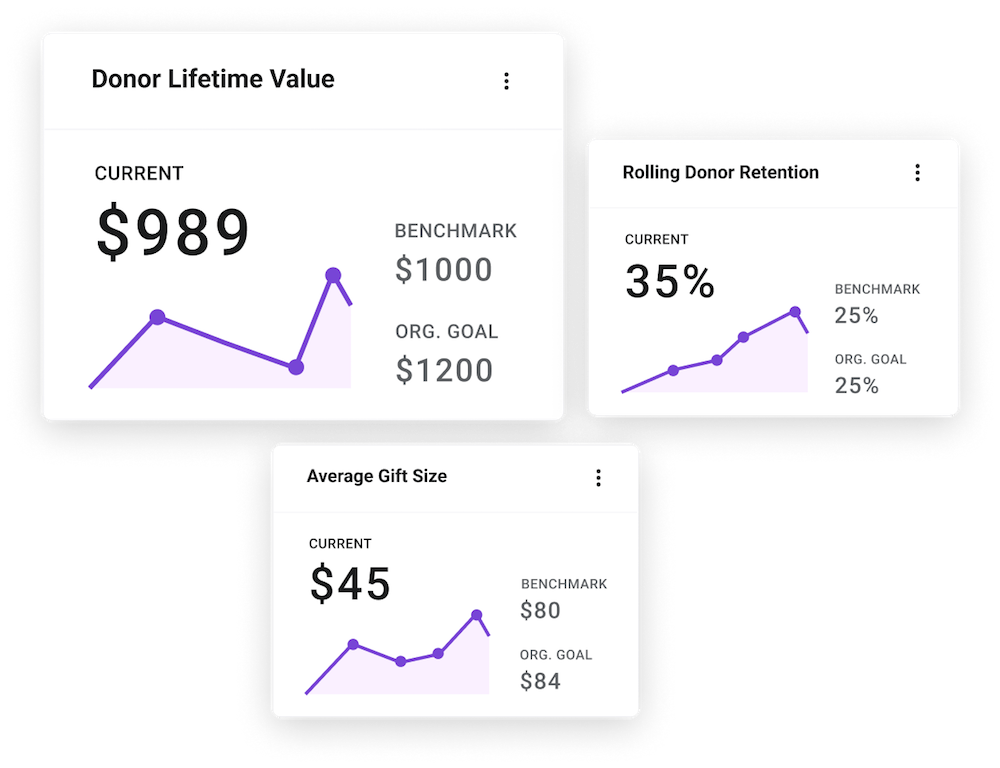What comes to mind when you think of artificial intelligence (AI) in the nonprofit sector?
Do you imagine robots counting the cash your organization has brought in from a fundraiser? Do you see yourself sitting on the couch while some software sends personalized emails to your donors? Do you see yourself inputting equations into an algorithm to make the AI work?
While Fundraising KIT proudly advocates for the use of AI in the nonprofit sector, we know there are many questions, challenges, and myths surrounding nonprofit AI. This article will unpack some of those challenges and suggest solutions that may or may not help you get on board the artificial intelligence train.
7 Common Questions, Misconceptions, and Myths About Nonprofit Artificial Intelligence
1. Will AI Give My Nonprofit Better Fundraising Results Than We Are Already Getting?
One of the main reasons that Artificial Intelligence exists is to improve efficiency and save us time by performing mundane tasks. After all, why use AI if you can do it just as well yourself?
You should not use AI just for the sake of using AI. It only makes sense to use AI when it helps improve your team’s efficiency, productivity, and accuracy. So, instead of asking if AI will make you better, consider the areas or tasks that your nonprofit team could use some help or support.
For example: If your fundraising team is spending tons of time deciding who to send fundraising appeals to or sending mass emails without getting good responses, then it may be time for you to consider getting an AI-powered tool that can automate your email communication and marketing process.
So, carefully consider the value proposition of the nonprofit AI tools on the market, the right tool should have the track record of supporting nonprofit teams and improving their output.
FREE Donor Profile Template for Fundraisers
Use this template to record and track important details about your donors and prospects so you can target the right individuals for the right fundraising campaigns.
2. AI-Powered Tools Are Time-Consuming
Many nonprofit professionals are under the preconception that using AI tools means they can simply set it and forget it.
In reality, nonprofit AI tools are like your virtual administrative assistants, or in the case of Fundraising KIT, a fundraising enablement personnel, that keep tasks moving and help optimize the work you’ve already done. In other words, when you incorporate AI into your work, you’re essentially collaborating with a new team member or support staff.
Like any good collaboration, you will need to keep reviewing the performance of your nonprofit AI tool. This can seem like extra work but the truth is you’ll be saving time otherwise spent on actually doing the mundane tasks and can focus more on optimizing your results.
3. AI-Powered Tools Are Expensive
Artificial Intelligence tools can be expensive and nonprofits have to be especially careful about where each dollar goes. However, if you consider alternative options, you might find that nonprofit AI tools are a cost-effective solution.
Nonprofits looking to predict donor behavior may decide to hire a data scientist. While AI-powered tools will not directly replace the work of a data scientist, it will help your data scientist, and the rest of your team, to optimize their work and be more productive. The alternative would be to have your data scientist or analyst spending hours on end sifting through countless data points, and that approach will ultimately be more expensive than an investment in a nonprofit AI tool.
So, yes, nonprofit AI-powered tools may come with a high price tag but in the long run, it saves a lot of money and gives you a greater ROI.
Additionally, you should keep in mind that times are changing. As we learn more and more about AI, get better at building algorithms and using data, it is becoming less expensive to use AI solutions. There are many out-of-the-box nonprofit AI solutions that are more affordable now than ever before.
Many of these solutions are also built specifically for nonprofits, so they are solving the issues that your team currently face, at an affordable rate. Tools such as Fundraising KIT, Dataro and Gravyty are all accessible nonprofit AI-powered tools to consider.
4. AI Is Interesting But Not Actionable
Are you learning all sorts of interesting insights about or from Artificial Intelligence tools but not sure what to do with the information you’re gathering?
If you are, you should know that there’s a chance AI isn’t the problem here. The real issue might be the human application of AI. Like many technology solutions, AI needs to be applied when and where it can be most effective. Consider reviewing your nonprofit’s goals to see if the nonprofit AI tools in question provide solutions to your organization’s problem.
Go into your hunt for a nonprofit AI solution with a clear goal in mind and search for software that will specifically do that for you. For example, your goal may be to determine which donors your team should be focusing on cultivating. In which case, look for a tool that will segment donors accurately and help you gather actionable information about donor segments.
5. AI Requires Good, Clean Data
Artificial Intelligence requires good, clean data to give you accurate results, and for some organizations, keeping a clean database is a challenge. If you are feeding your AI tool messy, inaccurate data with gaps and duplications, you will not get the valuable results you are looking for.
For example, suppose you are using an AI tool to predict when donors will be ready to donate again, and your donor database is full of duplicate donors, old email addresses, and missing entries. In that case, you will not receive an accurate prediction. Don’t fret, though; once you put processes in place to keep your nonprofit’s data clean, it is easy to keep up with.
6. I Don’t Understand Data Science
Some corporate donors prefer making non-monetary or in-kind donations to
For many fundraisers and nonprofit executives, nonprofit data may seem complex and complicated, but you do not need to be a data scientist to use artificial intelligence. That may have been the case two decades ago, but today, there are many AI software solutions that translate data into easy-to-digest graphs, KPIs, and actionable insights. When you use these solutions, you don’t have to discern what the data tells you because the software does that for you.
Many tools also include a dashboard so you can get all of this information at a glance. This makes AI simple to use without a data scientist on your team.

7. AI Is Unethical
You want to make the execution of a corporate giving campaign as simple as
This age-old myth about Artificial Intelligence keeps several nonprofit professionals from testing or trialing AI-powered tools and reaping benefits.
At the heart of Artificial Intelligence are human beings. Human beings created the algorithms and the tools that allow you to use the algorithms. As a result, you and your nonprofit team, gets to use those AI tools in your work. AI does not exist on its own; you get to choose how you use it. Ethics guide a person’s behavior, and you get to guide artificial intelligence’s behavior and outcomes; you are its moral code.
So, What Is The Case Against AI?
Now that we have looked at several challenges, questions and myths surrounding the use of Artificial Intelligence in nonprofits, what is the case against AI?
AI has been said to be expensive, time-consuming, and not actionable. But these notions couldn’t be further from the truth. Nonprofit AI offers your organization unique solutions to solve problems that would otherwise cost you time and money.
You should not use artificial intelligence solutions at your organization just because of the hype surrounding this kind of technology. You should consider using nonprofit AI tools, like Fundraising KIT, because it can help your team be more efficient, productive, and better at making good decisions.

Talk to a fundraising expert today to learn more about how Fundraising KIT can quickly and easily help your nonprofit raise more for your cause.

Ally Smith
Content Writer at Fundraising KIT
With a passion for nonprofit innovation, Ally has spent her career helping build community capacity and supporting social innovation as a customer success manager turned, youth worker, turned social researcher.
After leaving the tech start-up landscape, she pursued a Master’s in Philanthropy and Nonprofit Leadership and has since supported nonprofits to innovate and grow. A Canadian ex-pat and social entrepreneur based in Edinburgh, she enjoys hiking, baking bread in a panic, and pursuing the full Scottish experience- rain and rugby included!








I have read so many posts about the blogger lovers however this post is really a good piece of writing, keep it up
whoah this blog is wonderful i really like reading your articles. Keep up the great paintings! You realize, a lot of people are hunting round for this info, you could help them greatly.
Thank you for nice information
https://uhamka.ac.id/